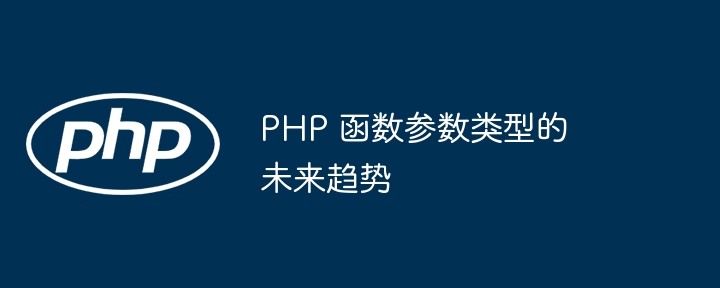PHP 8.0 及更高版本新增了“严格类型”特性,解决了参数类型不匹配时的自动转换问题。函数参数声明类型后,若输入类型不匹配,将引发 TypeError 异常。此功能提高了代码健壮性、可读性,并增强了 IDE 支持。在使用时,需注意更新现有代码、考虑联合类型、了解第三方库的类型模式。

PHP 函数参数类型的未来趋势:严格模式
PHP 8.0 及更高版本引入了一种名为“严格类型”的新特性,它解决了在参数类型不匹配的情况下自动转换变量值的问题。以下是该功能的语法:
function myFunction(string $param1, int $param2): void
{
// ...
}在上面的示例中,myFunction 函数声明其参数 $param1 为 string 类型,而 $param2 为 int 类型。如果函数被这样调用:
myFunction(123, "ABC");
PHP 将不会自动将 123 转换为字符串或 ABC 转换为整数,而会引发 TypeError。这有助于防止意外的类型转换,并提高代码的健壮性。
实战案例:验证用户输入
考虑一个验证用户输入的函数:
function validateInput($name, $email)
{
if (empty($name) || empty($email)) {
throw new Exception("Name or email cannot be empty.");
}
if (!is_string($name) || !is_string($email)) {
throw new Exception("Name and email must be strings.");
}
}在不使用严格类型的 PHP 7.x 版本中,如果用户输入不是字符串,则函数会静默地将它们转换为字符串。这可能导致错误和不一致的行为。
在具有严格类型的 PHP 8.0 版本中,相同的函数会强制执行字符串类型,并抛出 TypeError 异常:
validateInput(123, "example@example.com");
// TypeError: Argument 1 passed to validateInput() must be of the type string, integer given
validateInput("John Doe", true);
// TypeError: Argument 2 passed to validateInput() must be of the type string, boolean given收益
使用严格类型模式具有以下优点:
注意事项
使用严格类型时,需要考虑以下注意事项:
以上是PHP 函数参数类型的未来趋势的详细内容。更多信息请关注PHP中文网其他相关文章!